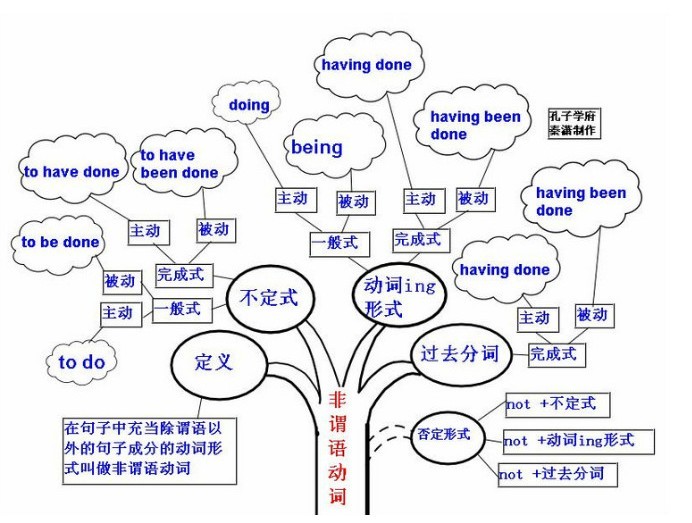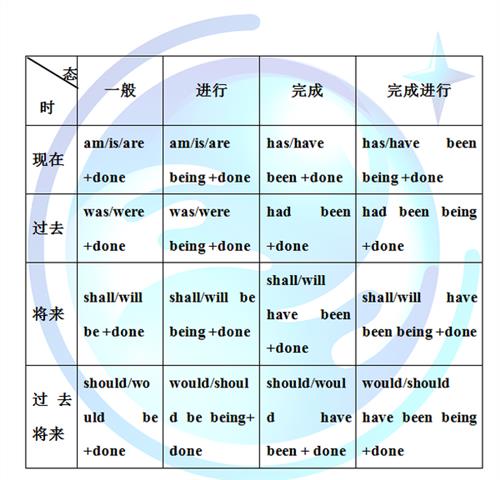基本介紹
- 中文名:謂語動詞
基本結構,概念,主謂一致,典型例題,
基本結構
英語句子的成分與現代漢語中學的句子成分類似,基本構成也包含主、謂、賓,有時有補語、狀語,還有插入語等成分。由做謂語的動詞在句子中稱為謂語動詞。在英語中,動詞按作用和功能主要分為兩大類,一類是謂語動詞,另一類是非謂語動詞。 非謂語動詞樹狀圖
非謂語動詞樹狀圖
 非謂語動詞樹狀圖
非謂語動詞樹狀圖一般來說沒有謂語的句子是不完整的,由於謂語是說明主語的,所以沒有謂語的例句就像個沒頭的蒼蠅,讓人覺得很亂,不知所云。但是有些句子中謂語是可以省略的,比如感嘆句,What a silly thing (you have done)!括弧內的是句子的主語和謂語部分均可省略。
所以掌握動詞用法非常重要,在英語中極為重要.動詞做謂語放在主語或賓語之後,比如:I love you中, love就是謂語動詞,又如You know what I know.中,兩個know都是謂語成分,緊跟在施動者後.這是謂語動詞的普通用法.動詞一般都可以做謂語,其中Do可以代替大多數謂語動詞.
至於特殊的謂語動詞用法很靈活,比如虛擬語氣中,謂語動詞常採用過去時.有的謂語還有固定用法,比如If I were you I would tell him the truth.這裡就體現的是虛擬語氣中Be動詞的固定變化,須識記.
還有一些可充當謂語動詞使用的動詞性短語,如turn off,look into,break up... ...
謂語動詞(Predicate Verb),非謂語動詞(Non-predicate Verb)
動詞可充當非謂語和謂語,充當謂語即謂語動詞. 謂語動詞在形態變化上受主語的限制,有人稱和數的變化,它是一個句子或一個從句中不可缺少的一部分。
概念
表示主語動作的詞語和詞組.
例如:我看電視.“看”就是謂語.
你正在上網.“上網”也是謂語.
I see a girl.我看見一個女孩.“看見”"see"就是這個句子的謂語.而see也是個動詞,所以就叫做謂語動詞.
而動詞短語就是動詞加小品構成的起動詞作用的短語叫動詞短語。例如:
Turn off the radio. 把收音機關上。(turn off是動詞短語)
動詞短語的構成基本有下列幾種:
1)動詞+副詞,如:blank out;
2)動詞+介詞,如:look into;
3)動詞+副詞+介詞,如:look forward to。構成動詞短語的副詞和介詞都統稱為小品詞。
主謂一致
主謂一致是指:
1) 語法形式上要一致,即單複數形式與謂語要一致。
2) 意義上要一致,即主語意義上的單複數要與謂語的單複數形式一致。
3) 就近原則,即謂語動詞的單復形式取決於最靠近它的詞語,
There is much water in the thermos.
但當不可數名詞前有表示數量的複數名詞時,謂語動詞用複數形式。
e.g. Ten thousand tons of coal were produced last year.
Large quantities of water are needed.
Large amounts of money are enough.
In western countries, mountains of rubbish are thrown away each day.
1. 並列結構作主語時謂語用複數。
Reading and writing are very important.
注意: 當主語由and連結時,如果它表示一個單一的概念,即指同一人或同一物時,謂語動詞用單數,and 此時連線的兩個詞前只有一個冠詞。
The iron and steel industry is very important to our life.
2.如果以what從句作主語,表語又是單數,主句的謂語動詞一般用單數;如果表語是複數,主句的謂語動詞一般用複數。
What caused the accident is a complete mystery.
What his father left him are a few English books.
注意:當what引導的名詞性分句作主語時,主謂一致問題極為複雜。著名學者周海中教授在論文《關於what-分句作主語的主謂一致問題》中就這一問題做了深入研究,並給出了10種的主謂一致關係。這些一致關係值得英語學習者和使用者特別注意。
典型例題
例題
The League secretary and monitor ___ asked to make a speech at the meeting.
A. is B. was C. are D. were
答案B. 註: 先從時態上考慮。這是過去發生的事情套用過去時,先排除A.,C.。本題易誤選D,因為The League secretary and monitor 好像是兩個人,但仔細辨別, monitor 前沒有the,在英語中,當一人兼數職時只在第一個職務前加定冠詞。後面的職務用and 相連。這樣本題主語為一個人,所以應選B。
主謂一致中的靠近原則
1) 當there be 句型的主語是一系列事物時,謂語應與最鄰近的主語保持一致。
There is a pen, a knife and several books on the desk..
There are twenty boy-students and twenty-three girl-students in the class.
2)當either… or… 與neither… nor, 連線兩個主語時,謂語動詞與最鄰近的主語保持一致。 如果句子是由here, there引導,而主語又不止一個時,謂語通常也和最鄰近的主語一致。
Either you or she is to go.
Here is a pen, a few envelopes and some paper for you.
謂語動詞與前面的主語一致
當主語後面跟有with, together with, like, except, but, no less than, as well as 等詞引起的短語時,謂語動詞與前面的主語一致。
The teacher together with some students is visiting the factory.
He as well as I wants to go boating.
No one except his own supporters agrees with him
有時依“就近一致原則”,但也可依“意義一致原則”或嚴格地依“語法一致原則”。Neither she nor I were there (意義一致) 我和她當時都不在那兒。(非正式)
Neither she nor I was there .(就近一致)(譯文同上句)(正式)但是,如果依“就近一致原則”而與其他兩項原則相矛盾時,則常常認為是不太合符規範的。No one except his own supporters agree with him .
僅他自己的支持者同意他的意見。(依“就近”和“意義”一致的原則;但語法上,“No one ”才是主語,謂語要改成“agrees”。“寫作中”一般要依“語法一致”原則。)如上:
Neither she nor I was there .(就近一致)(譯文同上句)(正式)但是,如果依“就近一致原則”而與其他兩項原則相矛盾時,則常常認為是不太合符規範的。No one except his own supporters agree with him .
僅他自己的支持者同意他的意見。(依“就近”和“意義”一致的原則;但語法上,“No one ”才是主語,謂語要改成“agrees”。“寫作中”一般要依“語法一致”原則。)如上:
謂語需用單數
1) 代詞each和由every, some, no, any等構成的複合代詞作主語,或主語中含有each, every, 謂語需用單數。
Each of us has a tape-recorder.
There is something wrong with my watch.
2) 當主語是一本書或一條格言時,謂語動詞常用單數。
The Arabian Night is a book known to lovers of English.
《天方夜譚》是英語愛好者熟悉的一本好書。
3) 表示金錢,時間,價格或度量衡的複合名詞作主語 時,通常把這些名詞看作一個整體,謂語一般用單數。(用複數也可,意思不變。)
Three weeks was allowed for making the necessary preparations.
Ten yuan is enough.
指代意義決定謂語的單複數
1) 在代詞what, which, who, none, some, any, more, most, all等詞的單複數由其指代的詞的單複數決定。
All is right. (一切順利。)
All are present. (所有人都到齊了。)
2) 集體名詞作主語時,謂語的數要根據主語的意思來決定。如family, audience, crew, crowd, class, company, committee等詞後用複數形式時,意為這個集體中的各個成員,用單數時表示該個集體。
His house isn't very large. 他的家不大。
His family are music lovers. 他的家人都是音樂愛好者。
但集合名詞people, police, cattle, poultry等在任何情況下都用複數形式。
Are there any police around?
3)有些名詞,如variety, number, population, proportion, majority 等有時看作單數,有時看作複數。
A number of +名詞複數+複數動詞。
The number of +名詞複數+單數動詞。
A number of books have lent out.
The majority of the students like English.
與後接名詞或代詞保持一致
1) 用half of, part of, most of, a portion of 等詞引起主語時,動詞通常與of後面的名詞,代詞保持一致。
Most of his money is spent on books.
Most of the students are taking an active part in sports.
2) 在一些短語,如 many a 或 more than one 所修飾的詞作主語時,謂語動詞多用單數形式。但由more than… of 作主語時,動詞應與其後的名詞或代詞保持一致。
Many a person has read the novel. 許多人都讀過這本書。
More than 60 percent of the students are from the city.百分之六十多的學生都來自這個城市。

